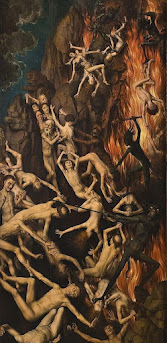Damnation roundup
 The realityof hell is the clear and infallible teaching of scripture and tradition. I would argue that even purely philosophicalargumentation can establish that the soul that is in a state of rebellionagainst God at death will remain that way forever. The universalist heresy denies these truths,and insists that all will be saved. Ithas in recent years seen a remarkable rise in popularity. In Catholic circles, Balthasar’s view thatthere is at least a reasonable hopethat all human beings will be saved has also gained currency.
The realityof hell is the clear and infallible teaching of scripture and tradition. I would argue that even purely philosophicalargumentation can establish that the soul that is in a state of rebellionagainst God at death will remain that way forever. The universalist heresy denies these truths,and insists that all will be saved. Ithas in recent years seen a remarkable rise in popularity. In Catholic circles, Balthasar’s view thatthere is at least a reasonable hopethat all human beings will be saved has also gained currency.These are extremelygrave delusions which, by fostering complacency, are sure to add to the numberof the damned. In reality, there is noreasonable hope whatsoever that all are saved. The relevant philosophical and theological considerations make this conclusionunavoidable. I have addressed theseissues in some depth in many articles over the years, and it seemed to me agood idea to collect them in one place for readers who might find thatuseful.
My most detailedand academic presentation of the philosophical considerations showing that asoul that is locked on evil at death will remain so perpetually can be found inmy New Blackfriars article “Aquinason the Fixity of the Will After Death” and in chapter 10 of my book ImmortalSouls: A Treatise on Human Nature.
I have alsoaddressed this issue, along with other questions that frequently arise inconnection with the idea of damnation, in a series of articles here at theblog. Why can a soul that is damned notrepent? Is there a sense in which Goddamns us, or are we damned only insofar as we damn ourselves? Would annihilation not be a more suitablepunishment than perpetual suffering? Couldwe really be happy in heaven knowing that some are in hell? Might we deny that hell is everlasting withoutalso denying that heaven is everlasting? If there is no hell, why is it urgent torepent and be baptized? Is it hateful towarn people that they are in danger of hell? Wouldn’t it be pointless for God to create people who end updamned? These and other questions areaddressed in the following posts:
Speaking(what you take to be) hard truths ≠ hatred
The evidencefrom scripture, the Fathers and Doctors of the Church, and the Magisterium thatthe reality of hell has been infallibly taught is overwhelming. I set this evidence out, and address somecommon attempts to get around it, in the following articles:
Scriptureand the Fathers contra universalism
Popes,creeds, councils, and catechisms contra universalism
In recentyears, the most influential defender of universalism has been David BentleyHart. At Catholic Herald, I reviewed Hart’s book That All Shall Be Saved:
DavidBentley Hart’s attack on Christian tradition fails to convince
Hart respondedto this review, and in reply to his response I wrote the following much more detailedcritique of his book:
I had reasonto revisit Hart’s arguments in a further article:
I addressBalthasar’s views and the dangerous complacency they foster in another seriesof articles:
Finally, afew posts that are not on the topic of hell per se, but are relevant. I would suggest that contemporary discomfort withthe doctrine of hell is, at least in part, more a reflection of the softness ofmodern Western society than a genuinely Christian understanding of the divinenature and the human condition. Modern peoplesimply cannot fathom a God who would permit great suffering, much less a Godwho would actually inflict it as punishment. But Christianity has always taught that suffering is necessary even forthe righteous, and is a feature rather than a bug of salvation history. And if even the righteous must suffer, howmuch more the unrepentant wicked? A few relevantarticles are:
The“first world problem” of evil
Augustineon divine punishment of the good alongside the wicked
Edward Feser's Blog
- Edward Feser's profile
- 329 followers



